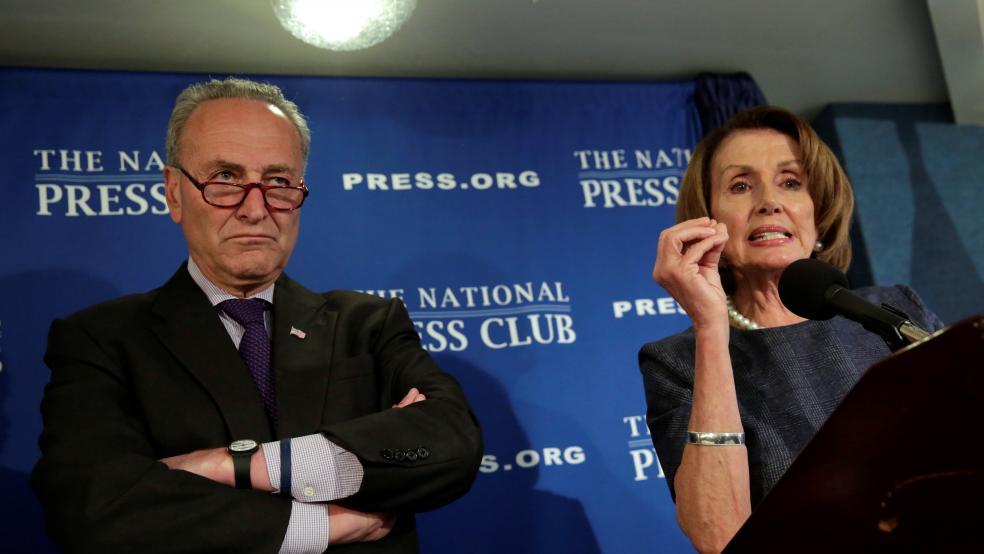When President Trump unveils his fiscal 2018 budget plan this week, he will be kicking off an explosive debate on Capitol Hill that could lead to another government shutdown.
The new Republican administration plans to shrink scores of domestic agencies and programs as well as the State Department and the Internal Revenue Service to offset the cost of a $54 billion boost in defense spending. And Trump needs tens of billions more to fund a massive buildup of immigration and border patrol forces and to begin construction of a 2,000-mile-long wall along the southern border that could cost $25 billion.
Related: Trump Could Face His First Fiscal Crisis Over Raising the Debt Ceiling
Until recently, Democrats have had relatively little critical to say about Trump’s spending priorities. A few – including Senate Democratic Leader Chuck Schumer of New York and Sen. Bernie Sanders (I-VT) -- even suggested the Democrats might find common ground with the new president on a handful of proposals, such as $1 trillion for infrastructure spending or a paid family leave program.
But it now appears that the Democrats have concluded that their best comeback strategy is to oppose Trump and GOP leaders at every turn -- just as the Republicans regained control of the White House and both chambers of Congress by opposing former President Obama on virtually every major issue, from health care and infrastructure to the environment and a nuclear non-proliferation deal with Iran.
On Monday, Schumer and four other leading Democrats put Senate Majority Leader Mitch McConnell (R-KY) on notice they were prepared to precipitate a government shutdown if Trump and the Republicans insist on including the first down payment on construction of the border wall in a $1 trillion package of spending bills needed to keep the government operating for the remainder of the fiscal year.
The Schumer letter also warned against adding other “poison pills” to the spending bills, such as defunding Planned Parenthood or rolling back environmental or consumer protections. And it argued that additional funds should be added for domestic programs to match any additional military spending demanded by Trump.
Related: Trump’s Lofty Vision of Renewal Comes with a Huge Price Tag
“We believe it would be inappropriate to insist on the inclusion of such funding in a must-pass appropriations bill that is needed for the Republican majority in control of the Congress to avert a government shutdown so early in President Trump’s administration,” the letter stated.
While Trump’s overall fiscal 2018 budget proposals will be subject to a lengthy review and action over the coming months, Congress is facing a looming April 28 deadline to complete authorization of funding for the remainder of the current fiscal year that runs through Sept. 30.
McConnell and House Speaker Paul Ryan (R-WI) decided late last year to postpone final action on this year’s spending to give Trump an opportunity to weigh in on budget priorities, especially this year’s defense spending levels. Trump – who has vowed to increase military funding sharply -- is pressing Congress to lift the legal caps on discretionary defense spending this year and next.
The Republicans are using special budget “reconciliation” rules to try to ram through the Obamacare repeal and replacement legislation in the coming weeks with a simple majority, without any assistance from the Democrats. However, they will definitely need at least some Democratic votes in the Senate to achieve the 60-vote super-majority necessary to complete work on this year’s appropriations bills and avert a government shutdown.
Related: Putting Trump’s $54 Billion Military Spending Boost Into Context
The Republicans hold a 52 to 48 vote majority in the Senate. Even if McConnell can hold together all the GOP votes, he would still need the support of at least eight Democrats to achieve cloture and move to final passage of the massive spending bills.
The last government shutdown in October 2013 lasted for 16 days and forced the furloughing of more than 800,000 federal workers. That shutdown was triggered by a bruising battle between the Obama administration and conservative Republicans in the House and Senate who were attempting to cut funding for the Affordable Care Act.
The funding disputes this year will be every bit as difficult to resolve, with neither party inclined to engage in the type of political give and take necessary to avoid a crisis.
Trump and the Republicans are gambling that they can achieve their most important goals – including the repeal and replacement of Obamacare, overhauling the Medicaid program and passing major tax cuts -- without inviting Democrats to the negotiating table.
But with their own party badly fractured over an Obamacare replacement and sharp divisions over tax policy and trade, Trump eventually will have no choice but to seek Democratic support to achieve the semblance of a successful legislative program.
Related: The Debt Ceiling: What Is It and Why Does It Matter?
What’s more, the Trump administration and GOP leaders have yet to reveal their strategy for averting a debt ceiling crisis this fall. It’s far from clear whether Democrats will agree to cooperate or find ways to put up obstacles to increasing the Treasury’s borrowing authority.
With the national debt fast approaching an historic $20 trillion, the Treasury this week technically bumped up against its borrowing authority and has begun taking “extraordinary measures” to buy some extra time before it must default on its loans.
By early September, Trump and Congress will be under mounting pressure to enact legislation to increase the Treasury’s borrowing authority to protect the government’s AAA credit rating. Because many conservative Republicans will be unwilling to vote for a higher debt ceiling, Schumer and House Democratic Leader Nancy Pelosi of California should have some added leverage over the Republicans in negotiating a budget or tax deal.





